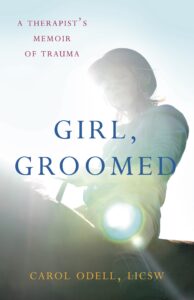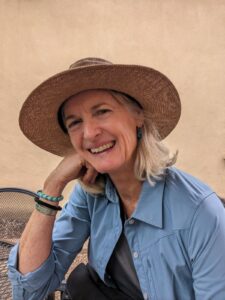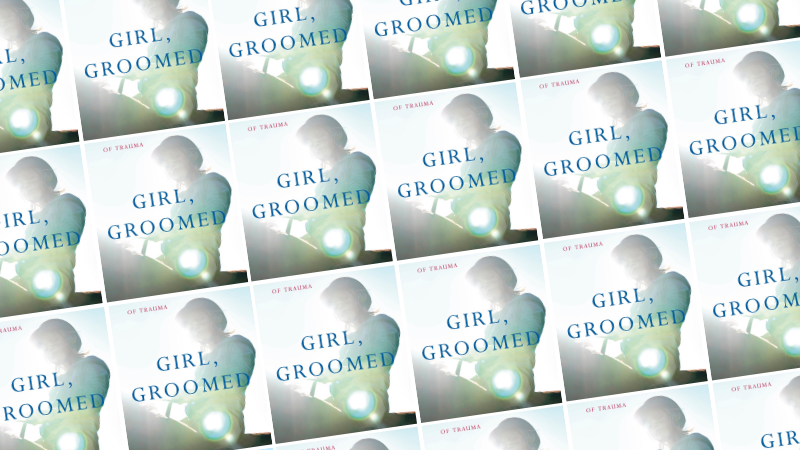 SEATTLE – Seasoned psychotherapist Carol Odell’s memoir “Girl, Groomed: A Therapist’s Memoir of Trauma” (She Writes Press, April 22, 2025) is an unflinching exploration of her journey to confront and heal from the complex trauma of childhood sexual abuse within the world of Virginia’s equestrian show-jumping circuit.
SEATTLE – Seasoned psychotherapist Carol Odell’s memoir “Girl, Groomed: A Therapist’s Memoir of Trauma” (She Writes Press, April 22, 2025) is an unflinching exploration of her journey to confront and heal from the complex trauma of childhood sexual abuse within the world of Virginia’s equestrian show-jumping circuit.
Raw and riveting, “Girl, Groomed” is an evolving story of coming to terms with the impacts of Odell’s own history of sexual abuse and violence at the hands of a predatory horse trainer who, for far too much of her young life, held all the reins. Set in the equestrian world of Virginia, this candid memoir details how, starting at ten years old, Carol falls under the spell of Clarentine, the charismatic—and explosively violent—owner of the stables just down the hill from her house. In tandem with that story, Carol examines the multi-faceted consequences of the complex trauma that resulted from the exploitative relationship Clarentine cultivated with her – including the resulting crisis she blindly imposes on her marriage. Chapters toggle back and forth between scenes of her childhood growing up jumping horses on the show circuit and the therapy sessions she later undergoes as an adult.
Using her own journey as an example, Carol demonstrates in this insightful memoir how unintegrated trauma limits us and our connection with others—and how the work of uncovering and reintegrating “what we do with what happens to us” can become the very source of our liberation.
“A powerful, quietly moving memoir of abuse that encapsulates one woman’s incredible resilience.” – Kirkus Reviews
“Girl, Groomed: A Therapist’s Memoir of Trauma”
Carol Odell | April 22, 2025 | She Writes Press | Memoir
Paperback | ISBN: 978-1647428723 | $17.99
 Carol Odell, LICSW, grew up riding horses on the show jumping circuit in Virginia. She has been a practicing psychotherapist facilitating groups and working with couples and individuals since 1984. Married for 38 years and the mother of a grown son, her other passions include: squash, pickleball, partner dancing, mosaics, writing, hiking, traveling, and being in community with friends and family. She and her husband, Mark, currently split their time between Seattle and Cle Elum, Washington. Find out more about her at carolodellmsw.com.
Carol Odell, LICSW, grew up riding horses on the show jumping circuit in Virginia. She has been a practicing psychotherapist facilitating groups and working with couples and individuals since 1984. Married for 38 years and the mother of a grown son, her other passions include: squash, pickleball, partner dancing, mosaics, writing, hiking, traveling, and being in community with friends and family. She and her husband, Mark, currently split their time between Seattle and Cle Elum, Washington. Find out more about her at carolodellmsw.com.
Follow Carol Odell on Instagram @mosaicofthoughts_
“In ‘Girl, Groomed’ we are given the heartbreaking, and at times terrifying story of a young girl persistently and indelibly targeted by a sexual predator. Odell holds her story with the reverence of a survivor and the wisdom of the therapist she eventually became. Stirring, unputdownable, and ultimately a story of courage and hope, this book’s beauty lingers long after you have closed its pages.” – Meghan Riordan Jarvis, “End of the Hour: A Therapist’s Memoir”
“Through candid reflection and gripping prose, Odell examines the emotional toll of normalized abuse, the insidious power dynamics she faced, and her long, winding journey toward healing and self-compassion. This memoir offers a profound look at the lasting impact of trauma and the courage it takes to rebuild one’s life.” – Mary Catherine McDonald, “Unbroken: The Trauma Response is Never Wrong”
“This is a story of a violent man who relied on complicity and coercion to leverage—and eventually poison—a young girl’s love of horses, but it is, above all, the story of that little-girl-turned-woman who found the courage and support to take her confidence, agency and majestic horses, back.” – Courtney Maum, “The Year of the Horses”
In an interview, Carol Odell can discuss:
- The catalyst for healing – A personal crisis, like her husband asking her to leave, became a pivotal wake-up call for confronting unprocessed trauma and its ripple effects. Healing is not just about the self but also about repairing relationships and breaking harmful patterns.
- Understanding grooming and abuse – Grooming often involves a slow desensitization of harmful behaviors, making them harder to recognize in the moment. Predators exploit power imbalances and access to victims, emphasizing the need for oversight and accountability in these environments.
- Broader impacts and advocacy – Carol’s story aligns with the #MeToo movement, highlighting grooming, abuse normalization, and the courage to challenge cultural complicity. She advocates for creating compassionate spaces for survivors to share their stories on their terms, without pressure or judgment.
- Practical advice for therapy and self-work – Effective therapy involves observing resistance, challenging narratives, and staying present with discomfort as it arises. Healing requires balancing self-compassion with accountability, fostering growth without judgment.
- The process of healing and integration – Trauma cannot simply be “gotten over;” it must be understood, integrated, and reframed to prevent cycles of self-judgment and shame. Observing how trauma influences behaviors, like control and criticism in relationships, is key to developing agency and stopping the perpetuation of harm.
- Empowerment through rewriting narratives – Survivors can reclaim their power by untangling past trauma’s impact on their lives and crafting new, self-aware responses to triggers. Resilience is built not by avoiding triggers but by consciously responding differently when they arise.
- Personal and professional evolution – Sharing her story publicly represents a significant new phase in Carol’s healing journey, embracing vulnerability and connection. Looking forward, she envisions creating space for personal growth, connecting with horses, writing, and spending time with loved ones.
- The challenges and rewards of memoir writing – Revisiting traumatic memories through writing required confronting emotions long buried, which was both painful and liberating. Writing serves as a powerful medium for emotionally reconnecting with past experiences and integrating them into a fuller sense of self.
An Interview with Carol Odell
What inspired you to begin the challenging, yet ultimately rewarding, journey of confronting and unpacking the trauma from your childhood abuse?
My husband kicking me out of the house was a harsh wake up call for me to confront how my past unprocessed trauma was still negatively impacting my present life and those around me. I realized that despite a lot of work that I had already sifted through, there were other pieces of my history of abuse and constant exposure to violence that I was negatively paying forward with my husband in the form of control, superiority, contempt…Through what I discovered during this crisis and the freedom I experienced because of this work, I then wanted to share more broadly with others.
What was the most challenging part of writing your memoir?
Putting myself back into the difficult scenes involving abuse was challenging as well as healing. It required me to write down the memories that I had emotionally disconnected from. By recreating these scenes, I had to dredge up those old fragmented away emotions and live into what I had been avoiding. The writing became a portal for me to feel my way back into what had happened to me. It was both painful and liberating.
How did you manage the difficult feelings that must have come up while writing painful scenes in your memoir?
I took regular breaks from my writing and during those I would kickbox while watching tennis on TV. The combination of moving my body in order to literally punch out the stress while watching tennis, which I find rhythmic and meditative, became a good destresser for me. Because writing is such a solitary activity I also made sure to balance this by spending lots of time with friends and in my various communities. Our nervous systems need movement and relationships with others to discharge and heal trauma. It is important that everyone customize whatever works for them.
How did you identify the efforts of your abuser to “groom” you? What signs should people look for? What should we understand about abusers?
As a kid, I had no context or framework to understand that I was being incrementally groomed by a predator. Now looking back I can see how there was such a slow progression of transgressions that it became normalized – like a frog in boiling water. For me, I wanted to keep the relationship with the horses so my abuser’s increasing attention just became the price to pay. As a way of coping, I also created a narrative that made it seem OK and like I was handling the situation. The typical predator/pedophile will commit 117 acts of abuse over the span of their lifetime. They create situations where they have access to children and a power imbalance. In circumstances ripe for this, there needs to be extra accountability and oversight.
Can you explain the importance of integrating trauma as opposed to “getting over it?” Why does this matter? What happens if you take a different approach?
There is a strong cultural notion that the past and all traumatic events are something to “get over.” We all want this to be true. The result is that victims can end up negatively judging themselves and self-shaming when the impact lingers or when the nervous system gets retriggered. There is an honoring of self when we can see with clarity what has been lived through and that it isn’t our fault. The ways of coping were creative and helpful at the time even if they are also now limiting. This recognition of trauma informs our lives, but it doesn’t need to define us. Here is where the work can help rewrite our stories.

A former award-winning journalist with national exposure, Marissa now oversees the day-to-day operation of the Books Forward author branding and book marketing firm, along with our indie publishing support sister company Books Fluent.
Born and bred in Louisiana, currently living in New Orleans, she has lived and developed a strong base for our company and authors in Chicago and Nashville. Her journalism work has appeared in USA Today, National Geographic and other major publications. She is now interviewed by media on best practices for book marketing.

